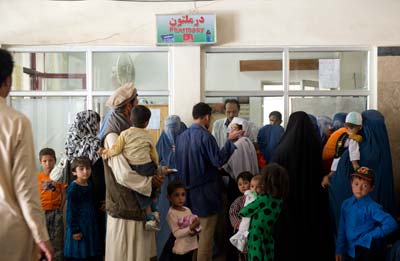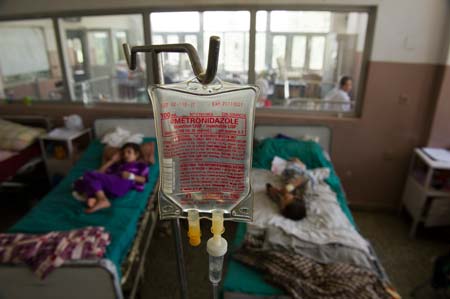Reporting on healthcare in Kabul
As I looked out the airplane window over the notorious mountain ranges that border Kabul, Afghanistan, I had a much-delayed second thought. I was about to spend two weeks in a city targeted almost daily by some of the world’s most dangerous people.

A few weeks earlier, I had accepted a six-month assignment to work as a communications consultant for Health Partners International of Canada (HPIC) and without hesitation, agreed to travel to Kabul to document progress of the Montreal-based non-governmental organization’s project there.
I took solace in knowing I was landing in Kabul well prepared. I had been briefed to expect the young men stationed on nearly every street corner, carrying massive automatic weapons and laden with bullets, the extensive security procedures to enter any building — even going to the grocery store required a body search — and the fleets of Range Rovers carrying foreigners in and out of concrete compounds with armed guards.
I had prepared myself to spend two weeks in a bleak place inhabited by hostile citizens.
What I hadn’t anticipated was the lively energy of a bustling city full of gracious and curious people, the streets abounding with laughing children walking to school and the flocks of birds chirping cheerfully in the sunshine.
The constant threat of violence is very real, yet in contrast to what is broadcast by foreign affairs experts on the future of Afghanistan, the people of Kabul are generally positive and hopeful despite their circumstances.
With the fourth fastest growing population in the world, Kabul has exploded from 500,000 inhabitants in 2001 to more than five million today. The massive increase — a result of war and migration — has led to crushing demand on an overburdened healthcare system.

For two years, HPIC has been working in the Afghan capital with the Ministry of Public Health to develop pharmaceutical management within the healthcare system.
HPIC provides medication and hospital supplies donated by Canadian pharmaceutical companies to seven partner hospitals in Kabul. The largest Canadian presence working in the healthcare field in Afghanistan, HPIC has provided treatment for more than 80,000 Afghans to date, mostly women and children.
I visited hospitals where I spoke to administrators and doctors about the challenges they face as patient numbers increase and resources remain stagnant at best.
I interviewed doctors who bought substandard medication from local bazaars for patients who could not afford to buy it themselves.
I talked to patients’ families who had to supply the surgical gloves before a desperately needed surgery could be performed. I spoke with the father of a burn victim who was told that without the medication provided by HPIC, they would have had to make the journey to Pakistan for treatment.

How serious is the crisis? The United Nations reports there were 3,021 Afghans killed as a result of the conflict in 2011, a record high. That same year, more than 18,000 women died in childbirth.
Many women could have been saved with basic healthcare. They are rarely discussed in the media and it was my job to report their stories to Canadians who are in a position to help.
This was the kind of work I had hoped for when I applied to Concordia’s Department of Journalism a few years ago.
I knew that traditional journalism jobs were fast disappearing and that finding a permanent, full-time position in media would be difficult.
Journalists have to be creative in marketing their skills yet there will always be work for people who have the ability to tell a story effectively — be it through writing, photography or video.
Concordia taught me the skills that have allowed me to do exactly what I have always wanted to do: travel, tell stories and help improve the lives of others.
Related links

